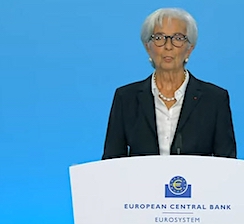The European Central Bank (ECB) on Thursday doubled its key interest rate to the highest level in more than a decade.
The central bank raised its deposit rate by a further 75 basis points to 1.5% – the highest rate since 2009.
ECB rates had been negative for eight years until it hiked in July.
“With this third major policy rate increase in a row, the Governing Council has made substantial progress in withdrawing monetary policy accommodation,” said the ECB.
“The Governing Council took today’s decision, and expects to raise interest rates further, to ensure the timely return of inflation to its 2% medium-term inflation target.
“The Governing Council will base the future policy rate path on the evolving outlook for inflation and the economy, following its meeting-by-meeting approach.
“Inflation remains far too high and will stay above the target for an extended period.
“In September, euro area inflation reached 9.9%. In recent months, soaring energy and food prices, supply bottlenecks and the post-pandemic recovery in demand have led to a broadening of price pressures and an increase in inflation.
“The Governing Council’s monetary policy is aimed at reducing support for demand and guarding against the risk of a persistent upward shift in inflation expectations.”
However, bond markets rallied and the euro fell as some investors saw signals that the ECB was worried about an economic downturn and may stop raising rates earlier than expected.
“Economic activity in the euro area is likely to have slowed significantly in the third quarter,” President Christine Lagarde told a news conference, talking of a higher likelihood of a recession.
The ECB also cut a key subsidy to banks in an effort to force them to repay early trillions of euros’ worth of ECB loans.
The bank cut the subsidy it provides to lenders through 2.1 trillion euros worth of cheap three-year loans called Targeted Longer-Term Refinancing Operations, or TLTROs.
The ECB also said detailed discussions on winding down the the bank’s massive holdings of mostly government bonds will begin in December.
REACTION:
Marcus Brookes, chief investment officer at Quilter Investors: “We have now seen successive 75 basis point interest rate increases by ECB. Having been a rate hike laggard, the ECB is now taking strong action to halt soaring inflation.
“This latest hike follows a 75 basis point increase in September and 50 basis points increase in August, bringing the rate to its highest for more than a decade.
“It comes as little surprise as the eurozone looks to tackle bloating inflationary pressures, with its annual inflation rate rising to 9.9% last month.
“Like all central banks, the balancing act faced by the ECB continues to be a tricky one. The bloc is faced with inflationary shock that requires decisive action, yet Russia’s ongoing war in Ukraine continues to cast a shadow of uncertainty over Europe that could end with weak demand and recession.
“While the further increase will be another welcome boost for banks and savers, it will not solve pressures on households brought about by the energy crisis.
“Furthermore, as the ECB raises interest rates to fight rampant inflation, sovereign debt dynamics will continue to deteriorate, and we need more on measures to be deployed to reduce the risk of another sovereign debt crisis.”
Alastair George, Chief Investment Strategist, Edison Group: “Today’s ECB rate decision is in our view the culmination of a determined effort to convince markets of the ECB’s willingness to address the surge in inflation, even with a slowdown in economic activity dead ahead.
“With inflation just under 10% across the eurozone risking spill-overs into wage increases, there is precious little room for policy error.
“Nevertheless, there is no surprise element in this interest rate increase which was comprehensively flagged ahead of time.
“We believe equity investors should now be looking further forward toward the timing of the peak in long term bond yields, as eurozone growth slows in 2023.”
Erik Nielsen, global chief economist at UniCredit Bank, told Bloomberg TV: “The ECB is on a tightening mode which I think is going to crush the economy …
“The economy is already weak and we’re tightening policy over a string of things.”
PIMCO portfolio manager Konstantin Veit: “We expect an additional 50 basis point policy rate hike in December, and a transition towards moving in 25 basis point increments next year as the hiking cycle pivots from policy normalisation to policy tightening.”
